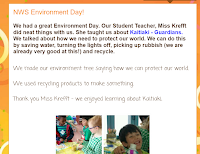
Ecowarriors
New Windsor School's Wastewise team
Monday, 17 October 2016
Garden to table

Tuesday, 14 June 2016
Celebrating World Environment Day
Check out how we celebrated the special day:
 |
| Getting our butterfly garden ready for the season |
 |
| Making a scarecrow from recycled material |
 |
| Selling fresh herbs from our garden |

Check out our class blogs:
 |
| Room 1 |
 |
| Room 14 |
 |
| Room 12 |
Thursday, 5 March 2015
Using design thinking to solve the problem
Monday, 13 October 2014
Can you solve this problem?
 Everyday the Ecowarrriors go through every worm farm bin and paper bin in the school.
This is what they see everyday. They find all kinds of rubbish that do not belong in the paper or worm farm bin. Why is this a problem you ask?
Everyday the Ecowarrriors go through every worm farm bin and paper bin in the school.
This is what they see everyday. They find all kinds of rubbish that do not belong in the paper or worm farm bin. Why is this a problem you ask?In Brooke's words: " It takes us about 5 - 10 minutes to sort out and wastes our learning time".
Do you have any suggestions on how to solve our problem? How can we save time?
Monday, 22 September 2014
Kira's Report
Kira
The picture shows one of the new worm farm bins and inside it. The bins cost $356.50 each and $1426 in total.
Food scraps such as banana peels and apple cores go into the worm farm bins. Citrus, meat and bread and also spicy food and waxed paper can not go into the worm farm bins.
Each food scrap that is put in the bin is eaten by the worms inside if they like it. They make worm castings after they eat it and the castings is a good plant fertilizer. They can also produce worm tea, a liquid fertilizer.
For worm farm collecting, a team of people from room 11 and sometimes room 12 come out and empty each classes bin into a big bin that when it is full, gets emptied into one of the new bins. As each classes bin comes to us, one person ticks the bins off on a notebook to keep track of where they are.
We do this process to get rid of food scraps and also to encourage the worms to make castings and worm tea.
Wednesday, 3 September 2014
Ecoclass of the Week: Room 1
Room 1
The Ecoclass of the week is Room 1. Have they recycled, reused and reduced?
Each week we will be posting classes who have shown the 3Rs - will your class be next?


